Part 10
Swear Fealty to Thy Lord
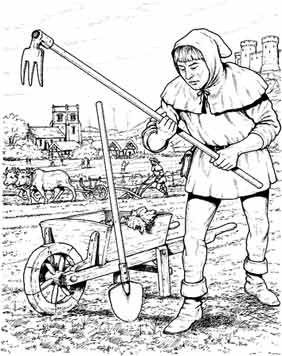
Thank Lord Gaafa the Fourth, for he read to me from Lord Gaafa's memoirs and taught me about my ancestors. Before I knew the ancient books, I hadn't imagined that my parents had parents, and they, parents before them.
A hundred years ago, my great great grandfather begged at the door of Lord Gaafa. In his arms he carried his waif of a wife, my great great grandmother, the last literate member of the family. She was thirteen, a virgin, and her yoni had yet to bleed. She was ill with a coughing fit brought by the accursed Chinese from their stinking jungles, and if she slept on the streets another night, she would die.
My ancestor's land had been taxed and collected by the bureaucracy of Grozny. My great great grandfather had inherited nothing more than a terrible debt and the family dishonor, and had taken to living off the scraps of the guildsmen.
---
"A debtor brought his wife to my manor, and having heard rumors of my kindness, he begged for a bed and meals with which to nurse her. I would have turned him away without remorse if not for the fluttering of her thin chest, her coughs, her arms shaking like soft birches in a summer storm. I looked again; by the quality of her hands, I judged she was the daughter of a craftsman; by the Hindu Vedas between her fingers, a friend of words.
I invited them to stay in a cottage on the banks of the Yangtse, where the debtor could draw fresh water from the river. After three months of my hospitality, the girl recovered, and as duty commanded, I had the debtor enslaved to break marble in Madras until he could repay the crown. I kept his wife's company for five years, after which the boy returned in the custody of a magistrate. The debtor had killed another man in a fight, and unless I paid his debt in full, the magistrate would hang him. At first I judged the boy worthy of his fate and refused to pay his debt, but his slim wife pleaded with me at supper, and I relented to her feminine persuasions and sent a servant with my purse to buy the boy's debt.
The next morning, I brought the debtor into my chambers and had a servant place a knife against his throat. I told him he had a choice, death or serfdom. If he swore fealty to me, as was custom; if he worked the land and gave me a tithe of his food and wood; if he became mine, I would lend him and his wife a parcel of my land, to till and tend in my name."
---
All thanks to Lord Gaafa. Without him, without the oath that bound my family to his bounty, I fear I wouldn't be alive.
The Sadhus of Russia

This morning, I found a Sadhu sleeping in my garden. It had rained the night before, but the ascetic hadn't come to my home to beg for my hospitality. Had he been to Lord Gaafa? No, when I approached from behind, I saw his hair glisten like polished flint, and around him the tips of his locks were mixed into the mud and cow shit.
I'd met a Sadhu before, when I was a child and my father took me to see the miracle of the holy man walking on coals. Yet that man had been clean and handsome. This Sadhu was dirty and stank of raw spices, sweat, and fertilizer.
He slept not on his side, back or stomach like a normal man. The Sadhu's legs were crossed, and he stiffened his back like a blade of grass after a winter frost. If not for his snores, I would suspect he was meditating.
"Holy man," I said to the Sadhu, "would you eat in my home?" My father said that eating with a Sadhu was a blessing from Ishvara, and in his presence you might find yourself closer to the Brahman. The Sadhu seemed to awake like a flower unfolding in the sun. His limbs unwrapped themselves and he rose from the mud like a pole. The Sadhu was thin, wrinkled, and tall. He turned and looked down at me with a benevolent, toothless smile. His gums were rotten and black, and his face was as wrinkly as a dried apple, but his eyes were clear as agate.
"Yáthāḥ vaḥ súsahā́sati," said the Sadhu. Then he strode about the garden and plucked three heads of cabbage, an eggplant, and two cobs of corn. He paused with the vegetables hugged against his damp yellow shirt and looked at me, anticipating.
I led him to my home, where I cut and boiled the vegetables. The Sadhu opened a pouch on his pack and unrolled a bundle of spices that I'd never seen before. He rubbed a handful of leaves between his soiled hands and dropped them into the water with the food.
If only my wife could be here. She was gone with a servant of Lord Gaafa IV to buy an ox for the farm. Oh, how she would love to meet such a strange man!
The Sadhu took the vegetables from the fire before I thought they were ready, and then distributed them to a pair of bowls he'd found on my shelf. It was then that I smelled what he had added to the vegetables. The spices were acrid, and my I felt my nose drain into my throat.
"Is this good to eat?" I said.
The Sadhu nodded, and said, "Take one bite." I took piece of cabbage in my hand. "Reject kama, the pleasure." I put the cabbage in my mouth, and nearly choked on the bitter tang of the spices. However, out of respect to my holy guest, I chewed and swallowed it. The Sadhu nodded, and picked up a second bite.
"Take another bite," he said, "reject artha, the wealth." I picked up a piece of the corn and scraped off a large bite. This time, the spices were not so sharp. However, my tongue tasted like an ash fire.
"Take another bite," he said, "reject dharma, the duty." I picked up a piece of eggplant and ate. It was like sand washing down the Yangtse, slow and drifting, indolent with age and caught in the slime.
"Take another bite," he said, "come closer to moksha." I took another bite of something, and it was like the seconds stretched ahead of me, each one longer than the last. I heard the Sadhu's voice. He recited hymns of the Regvida, and his voice left his throat in the form of an eagle and soared on high into the vault of my roof, the vault of heaven, where above me I saw Krishna in his universal form, a thousand faces of a thousand ages each holding a sword above the world, waiting for the day when it would be destroyed and remade.
Ishvara rode on the face of a blue storm, a storm of demons and devas in smoky thrones, moving against a backdrop of a shining sun, the Brahman, a brilliant source of light that left no shadow. Then we flew beyond it, into the moksha, into a world beyond the circle of life and death, into liberation and realization of our oneness with all and all time. In this whiteness, I shed myself like a butterfly shedding a cocoon; or maybe it was like a drop joining the ocean, losing its identity in the mass. A mind lost to mindlessness and lostness and...
I awoke in the evening. The Sadhu was gone, as were the rest of the vegetables. I rushed to my bed and looked under the mattress for my great great grandmothers copy of the four Vedas. I opened the book, and though I could not read, I stared at the words and remembered my vision of the divine. For the first time in my life, I could not help but believe that I'd been blessed.
The Millenial SlaughterAside posted:
I'm spreading tons of Missionaries throughout the world. Let Hinduism spread, bwahahaha! Shanghai and Beijing are already Hindu, and I can see them because I own the Hindu holy city and Hinduism is my state religion.
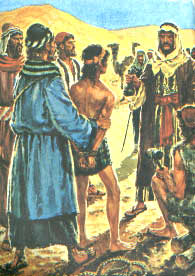
In April of the new millenium, Lord Gaafa IV's messengers came around the villages on the north side of the manor and warned us to watch for escaped slaves coming out of Madras. If we found them, we were to capture them and deliver them to our lord for a reward.
I expected nothing to happen, but in early May, I caught a man slaying a chicken in my yard. I confronted him and demanded payment for the fowl, and when he attempted to flee, I struck him in the calf with my hoe and lamed his leg. My wife and I collected him and secured him in our home, while my eldest son walked the length of the manner to warn the lord.
"Are you a slave?" My wife asked him again and again, and the man, a short creature of Indian descent, shook his head vigorously.
"We are not slaves," he said, "we are not slaves."
Lord Gaafa IV arrived personally with an armed guard, and he paid me five pieces of silver for the Indian I'd injured. "Lord," I said. The Lord had his men lash the Indian to the back of a mighty Novgorod Horse.
Lord Gaafa IV addressed me, "You may speak."
"Lord, how have so many slaves escaped?"
"It is not of concern to my serfs," said the lord.
"I am merely concerned." I pointed to the Indian. "That man slew my birds, and I want to know if I should expect more of his kind."
Lord Gaafa IV looked me over, and said, "There will be no more slaves. Now that the Courthouse of Madras is complete, all of them have been executed."
And Lord Gaafa would say nothing more.
AryabhataAside posted:
I killed 3 pop points in Madras to finish a courthouse over 23 turns early.
I've only got a few things left to build in this city before I can just pump out missionaries.
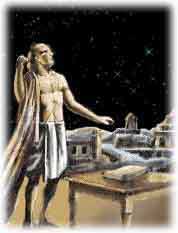
Writer of the Āryabhatīya, Aryabhata was a man of stars and circles. In both math and celestial observations, he worked to discover the concise clockwork that defined the rotations of the heavenly spheres, the devices which he believed contained the stars, the sun, and the colors of the day and night sky.
He founded an Academy in the Bombay Flatlands, and even today, devotees of math and astronomy crowd around his ancestral home, looking to divine secrets of the cosmos that Aryabhata could only dream.
Theological TradesAside posted:
In less than seven turns, I got another Great Scientist.
Philisophical gives me +100% GPP. The National Epic gives me +100% GPP. This combines with the Great Library and all my assigned specialists to produce great people at an extremely rapid pace.
The Egyptians adopted Christianity some time ago, and though the citizens of Port Kavkaz have mingled with them for some centuries, the Egyptians have never been allowed to found a temple within our state borders.
Is this theocracy? Though we have a state religion, we have never disallowed the religions of another nation. Yet the Egyptians have not founded a temple in a city with well over ten thousand adherents. Why is this? Has our theology become so rigid that we cannot abide other beliefs?
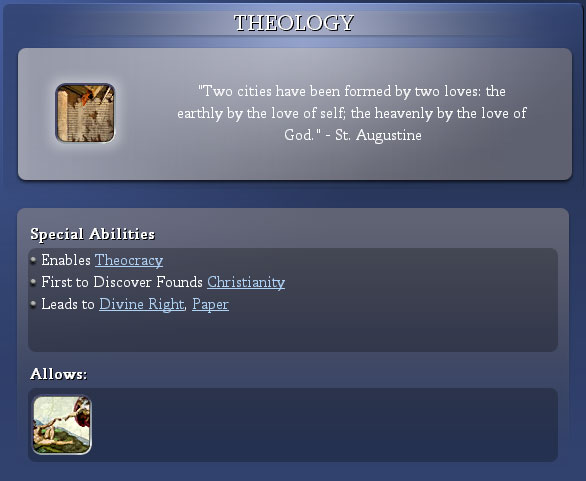
The Rise of GuildsAside posted:
Theology founds Christianity, allows you to build the Sistine Chapel (world wonder, +3 culture per each specialist), it leads to Divine Right, and it allows me to adopt the Theocracy civic.
Theocracy disallows the spread of non-state religions, and in every city with a state religion, units trained there get +2 experience points. This is the civic of crusades and other holy conflicts.
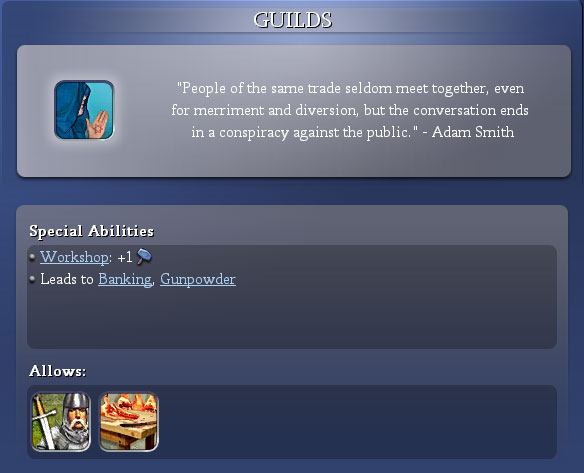
Guilds
In Moscow, in 1020 AD, the leather tanners drafted a document stating without reservation, "That no man would be allowed to tan leather without the assent of the Guild of Tanners." The Tsar has done nothing to assert his authority in place of the guild, and I fear that shortly, their declerations will become unwritten laws.
Grocers
In St. Petersburg, in 1025 AD, a young butcher by the name of Sekvon organized the creation of the butcher's guild. Within a year, they'd standardized several cuts of meat, and pleased with the increase in the quality and consistency of meat, the local governorship endorsed their guild's rights with the laws of the land.
Knights
I saw Lord Gaafa IV dressed in full plate, mounted on the back of his Novgorod Horse, and rushing another man with a lance. Originally a courtly sport, the art of jousting has even reached Grozny. If this fad holds, I expect that in a few years, all the lords of Russia will be practicing these martial arts.
So far...Aside posted:
I've gotten Guilds. This allows me to build Knights, a super powerful calvary unit, grocers--which increase health in a city--and it leads to Gunpowder, which I can get if I'm dying for a powerful military unit. However, I have knights, so I'm fine.
It took me a while to come back to this thread, but I'm back. Updates should come regularly again. I think I should declare war on China in the next update.
